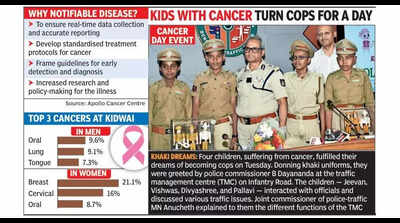- News
- Campaign seeks notifiable disease tag for cancer amid rising cases
Campaign seeks notifiable disease tag for cancer amid rising cases
Bengaluru: With over 14 lakh new cancer cases being reported annually — and projections indicating number touching 15.7 lakh this year in India, the medical fraternity is joining hands to launch a national campaign to urge centre to classify cancer as a notifiable disease.
Data from Kidwai Memorial Institute of Oncology reveals a steady 1% annual increase in cancer cases being reported at the institute alone, signalling a troubling national trend. Recognising the need for a unified approach, institutions such as Indian Council of Medical Research (ICMR), Indian Medical Association (IMA) and Apollo Cancer Centre, joined forces Tuesday, on the occasion of World Cancer Day, to push for a critical policy change.
Dr Vijay Agarwal, professor and lead consultant, medical oncology, Apollo Hospitals, pointed at the lack of a centralised cancer database as a major challenge. "We have anecdotal evidence that patients die because they present late, are unaware of their diagnosis, or because the incidence is higher than we realise — but we don't know for sure. Without enough data, we cannot address these issues effectively," he said.
While independent cancer registries exist in some states, India lacks a unified system to track cases nationwide. "Certain cancers seem more common in north India, others in the south. But do we have a policy to investigate why? Do we know at what stage these cancers are diagnosed? No, we don't," he said.
Dr Vijayanand, president, IMA Bangalore, emphasised the importance of making cancer a notifiable disease. "This step will bridge gaps in our cancer surveillance system and improve coordination among healthcare providers. By ensuring all cases are reported, we can better track incidence, mortality and survival rates, ultimately leading to more effective cancer care strategies."
Beyond treatment: Need for prevention
Dr T Naveen, additional in-charge director, Kidwai Memorial Institute of Oncology, stressed the importance of prevention over reactive treatment. "We cannot change the way cancer is managed unless we first identify the disease, understand its causes, and establish a national registry. Right now, we are mostly reacting — treating patients after they develop cancer — rather than taking proactive steps to reduce the burden, prevent cases through vaccination, or in some cases, eliminate the disease altogether."
BOX 1: Why cancer should be notifiable disease
- To ensure real-time data collection and accurate reporting
- Develop standardised treatment protocols
- Frame guidelines for early detection
- Increased research and policy making
Source: Apollo Cancer Centre
BOX 2: States where cancer is notifiable disease
15 states: Haryana, Karnataka, Tripura, West Bengal, Punjab, Mizoram, Andhra Pradesh, Kerala, Gujarat, Tamil Nadu, Arunachal Pradesh, Sikkim, Assam, Manipur, and Rajasthan
Source: IMA
BOX 3: Top 3 cancers at Kidwai
In men:
- Oral: 9.6%
- Lung: 9.1%
- Tongue: 7.3%
In women:
- Breast: 21.1%
- Cervical: 16%
- Oral: 8.7%
End of Article
FOLLOW US ON SOCIAL MEDIA










